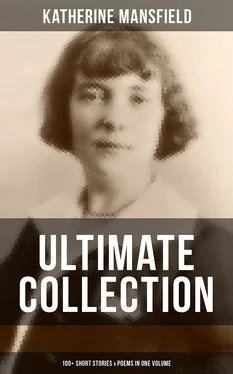Katherine Mansfield
Katherine Mansfield Ultimate Collection: 100+ Short Stories & Poems in One Volume
Prelude, Bliss, At the Bay, The Garden Party, A Birthday, Poems at the Villa Pauline
Published by
 Books
Books
Advanced Digital Solutions & High-Quality eBook Formatting
musaicumbooks@okpublishing.info2017 OK Publishing ISBN 978-80-7583-209-2
SHORT STORIES
Bliss, and Other Stories BLISS, AND OTHER STORIES Table of Contents
Bliss
Prelude
Je ne Parle pas Français
The Wind Blows
Psychology
Pictures
The Man without a Temperament
Mr. Reginald Peacock’s Day
Sun and Moon
Feuille d’Album
A Dill Pickle
The Little Governess
Revelations
The Escape
The Garden Party, and Other Stories
The Garden Party
At The Bay
The Daughters of the Late Colonel
Mr. and Mrs. Dove
The Young Girl
Life of Ma Parker
Marriage A La Mode
The Voyage
Miss Brill
Her First Ball
The Singing Lesson
The Stranger
Bank Holiday
An Ideal Family
The Lady's Maid
In a German Pension, and Other Stories
Germans at Meat
The Baron
The Sister of the Baroness
Frau Fischer
Frau Brechenmacher Attends A Wedding
The Modern Soul
At Lehmann's
The Luft Bad
A Birthday
The Child-Who-Was-Tired
The Advanced Lady
The Swing of the Pendulum
A Blaze
POETRY
Poems: 1909- 1910
Poems: 1911-1913
Poems at the Villa Pauline: 1916
Poems: 1917-1919
Child Verses: 1907
Table of Contents
Table of Contents
“. . . but I tell you, my lord fool, out of this nettle danger, we pluck this flower, safety. ”
Table of Contents
ALTHOUGH Bertha Young was thirty she still had moments like this when she wanted to run instead of walk, to take dancing steps on and off the pavement, to bowl a hoop, to throw something up in the air and catch it again, or to stand still and laugh at—nothing—at nothing, simply.
What can you do if you are thirty and, turning the corner of your own street, you are overcome, suddenly, by a feeling of bliss—absolute bliss!—as though you’d suddenly swallowed a bright piece of that late afternoon sun and it burned in your bosom, sending out a little shower of sparks into every particle, into every finger and toe? . . .
Oh, is there no way you can express it without being “drunk and disorderly”? How idiotic civilization is! Why be given a body if you have to keep it shut up in a case like a rare, rare fiddle?
“No, that about the fiddle is not quite what I mean,” she thought, running up the steps and feeling in her bag for the key—she’d forgotten it, as usual—and rattling the letter-box. “It’s not what I mean, because—— Thank you, Mary”—she went into the hall. “Is nurse back?”
“Yes, M’m.”
“And has the fruit come?”
“Yes, M’m. Everything’s come.”
“Bring the fruit up to the dining-room, will you? I’ll arrange it before I go upstairs.”
It was dusky in the dining-room and quite chilly. But all the same Bertha threw off her coat; she could not bear the tight clasp of it another moment, and the cold air fell on her arms.
But in her bosom there was still that bright glowing place—that shower of little sparks coming from it. It was almost unbearable. She hardly dared to breathe for fear of fanning it higher, and yet she breathed deeply, deeply. She hardly dared to look into the cold mirror—but she did look, and it gave her back a woman, radiant, with smiling, trembling lips, with big, dark eyes and an air of listening, waiting for something . . . divine to happen . . . that she knew must happen . . . infallibly.
Mary brought in the fruit on a tray and with it a glass bowl, and a blue dish, very lovely, with a strange sheen on it as though it had been dipped in milk.
“Shall I turn on the light, M’m?”
“No, thank you. I can see quite well.”
There were tangerines and apples stained with strawberry pink. Some yellow pears, smooth as silk, some white grapes covered with a silver bloom and a big cluster of purple ones. These last she had bought to tone in with the new dining-room carpet. Yes, that did sound rather far-fetched and absurd, but it was really why she had bought them. She had thought in the shop: “I must have some purple ones to bring the carpet up to the table.” And it had seemed quite sense at the time.
When she had finished with them and had made two pyramids of these bright round shapes, she stood away from the table to get the effect—and it really was most curious. For the dark table seemed to melt into the dusky light and the glass dish and the blue bowl to float in the air. This, of course in her present mood, was so incredibly beautiful. . . . She began to laugh.
“No, no. I’m getting hysterical.” And she seized her bag and coat and ran upstairs to the nursery.
Nurse sat at a low table giving Little B her supper after her bath. The baby had on a white flannel gown and a blue woollen jacket, and her dark, fine hair was brushed up into a funny little peak. She looked up when she saw her mother and began to jump.
“Now, my lovey, eat it up like a good girl,” said Nurse, setting her lips in a way that Bertha knew, and that meant she had come into the nursery at another wrong moment.
“Has she been good, Nanny?”
“She’s been a little sweet all the afternoon,” whispered Nanny. “We went to the park and I sat down on a chair and took her out of the pram and a big dog came along and put its head on my knee and she clutched its ear, tugged it. Oh, you should have seen her.”
Bertha wanted to ask if it wasn’t rather dangerous to let her clutch at a strange dog’s ear. But she did not dare to. She stood watching them, her hands by her side, like the poor little girl in front of the rich little girl with the doll.
The baby looked up at her again, stared, and then smiled so charmingly that Bertha couldn’t help crying:
“Oh, Nanny, do let me finish giving her her supper while you put the bath things away.”
“Well, M’m, she oughtn’t to be changed hands while she’s eating,” said Nanny, still whispering. “It unsettles her; it’s very likely to upset her.”
How absurd it was. Why have a baby if it has to be kept—not in a case like a rare, rare fiddle—but in another woman’s arms?
“Oh, I must!” said she.
Very offended, Nanny handed her over.
“Now, don’t excite her after her supper. You know you do, M’m. And I have such a time with her after!”
Thank heaven! Nanny went out of the room with the bath towels.
“Now I’ve got you to myself, my little precious,” said Bertha, as the baby leaned against her.
She ate delightfully, holding up her lips for spoon and then waving her hands. Sometimes she wouldn’t let the spoon go; and sometimes, just as Bertha had filled it, she waved it away to the four winds.
When the soup was finished Bertha turned round to the fire.
“You’re nice—you’re very nice!” said she, kissing her warm baby. “I’m fond of you. I like you.”
And, indeed, she loved Little B so much—her neck as she bent forward, her exquisite toes as they shone transparent in the firelight—that all her feeling of bliss came back again, and again she didn’t know how to express it—what to do with it.
Читать дальше

 Books
Books









